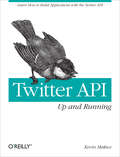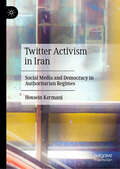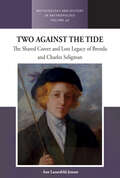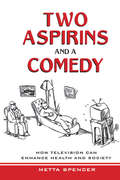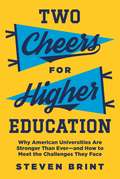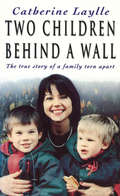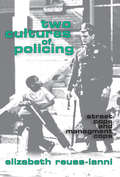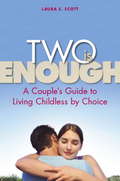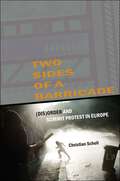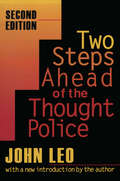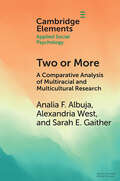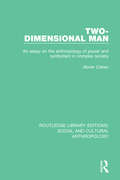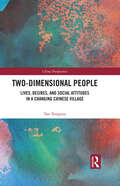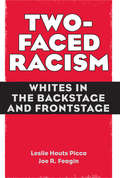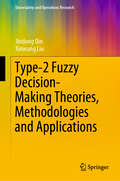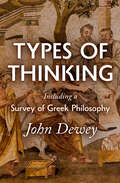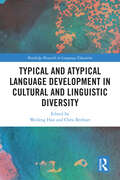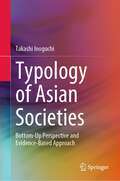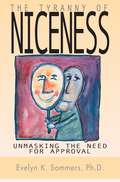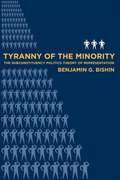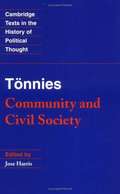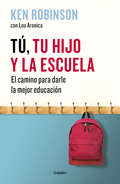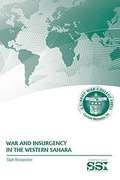- Table View
- List View
Twitter API: Learn How to Build Applications with the Twitter API
by Kevin MakiceThis groundbreaking book provides you with the skills and resources necessary to build web applications for Twitter. Perfect for new and casual programmers intrigued by the world of microblogging, Twitter API: Up and Running carefully explains how each part of Twitter's API works, with detailed examples that show you how to assemble those building blocks into practical and fun web applications. You'll also get a complete look at Twitter culture and learn how it has inspired programmers to build hundreds of tools and applications. With this book, you will: Explore every component of a Twitter application and learn how the API responds Get the PHP and MySQL code necessary to build your own applications, with explanations of how these ingredients work Learn from real-world Twitter applications created just for this book Discover the most interesting and useful Twitter programs--and get ideas for creating your own--with the book's Twitter application directoryTwitter offers a new way to connect with people on the Internet, and Twitter API: Up and Running takes you right to the heart of this technology. "Twitter API: Up and Running is a friendly, accessible introduction to the Twitter API. Even beginning web developers can have a working Twitter project before they know it. Sit down with this for a weekend and you're on your way to Twitter API mastery." --Alex Payne, Twitter API Lead "Twitter API: Up and Running is a very comprehensive and useful resource--any developer will feel the urge to code a Twitter-related application right after finishing the book!" --The Lollicode team, creators of Twitscoop
Twitter Activism in Iran: Social Media and Democracy in Authoritarian Regimes
by Hossein KermaniThis book investigates Twitter activism in authoritarian regimes, with particular attention to Iran. Twitter provides citizens around the globe with a free and quick way to engage in politics and public discourses. The role of Twitter, alongside other social media, is even more critical in authoritarian regimes where official media is systematically monitored and censured. Thus, social media is vital in restrictive (non-democratic) societies for people to seek their liberty, raise their voice, and create counter-narratives and discourses. There is substantial research into Twitter and democracy, both in democratic and non-democratic regimes. However, Iran, as a country with a high population of tech-savvy users who actively participate in political discussions online, remains understudied to a great extent. Twitter in Iran has been blocked since the 2009 presidential election and its subsequent protests, the Green Movement. Nevertheless, Iranians have been continually using it to date.Recently, another significant hashtag movement unfolded in Iran after the death of Mahsa Amini. But it is only an instance of how Iranians employ Twitter to fight a dictatorship. Given the unique context of Iran as a non-democratic society with a high number of Twitter users, this book tries to explore how Iranian users participate in politics, challenge the regime, mobilize their protests, and shape anti-regime discourses. It also examines the strategies that the Iranian regime takes to dismantle Twitter activism. Therefore, this work will fill some gaps in the existing literature on Twitter and democracy, which is relatively Western-centered.
Two Against the Tide: The shared career and lost legacy of Brenda and Charles Seligman (Methodology & History in Anthropology #48)
by Ann Lazarsfeld-JensenWhen Charles Seligman invited his wife, Brenda, to share his tent in 1907, he sanctioned a professional place for female fieldworkers in anthropology. Seligman was a groundbreaking pioneer of ethnographic work in Oceania and Africa. He treated shellshocked soldiers, he amassed museum collections and he fathered a generation of exceptional students. Brenda, his first student, became a scholar in her own right. Eighty years after his death, the Seligman legacy was deleted from the institution he began. Two Against the Tide explores how as wealthy Anglo-Jews, Charles and Brenda Seligman built a shared career through secret benevolence and silent endurance of hardship.
Two Aspirins and a Comedy: How Television Can Enhance Health and Society
by Metta Spencer"An extraordinary book which makes a vital contribution to our understanding of the potential power for healing and goodness in 'television entertainment'." Arlie Hochschild, author of The Time Bind (2001) "Despite the light title, this is a serious book about the healing possibilities of television. ! Provocative and enlightening." Beth Montemurro, Penn State University Can television be a positive force in society? Can socially conscious entertainment change the world? Two Aspirins and Comedy arrives at surprising and unconventional answers to these questions. Metta Spencer delves deep into the significance and power of entertainment as a means to influence society. She finds current examples of socially constructive television and demonstrates how mass entertainment can better use its power to positively influence society. In a climate where television is often a culprit for society's woes, Spencer casts a redemptive eye on the medium. She asserts that television, like other fictional landscapes, offers invaluable lessons, emotional bonding and catharsis for a modern society whose members are increasingly isolated.
Two Cheers for Higher Education: Why American Universities Are Stronger Than Ever—and How to Meet the Challenges They Face (The William G. Bowen Series #112)
by Steven BrintA leading expert challenges the prevailing gloomy outlook on higher education with solid evidence of its successesCrushing student debt, rapidly eroding state funding, faculty embroiled in speech controversies, a higher-education market disrupted by online competition—today’s headlines suggest that universities’ power to advance knowledge and shape American society is rapidly declining. But Steven Brint, a renowned analyst of academic institutions, has tracked numerous trends demonstrating their vitality. After a recent period that witnessed soaring student enrollment and ample research funding, universities, he argues, are in a better position than ever before.Focusing on the years 1980–2015, Brint details the trajectory of American universities, which was influenced by evolving standards of disciplinary professionalism, market-driven partnerships (especially with scientific and technological innovators outside the academy), and the goal of social inclusion. Conflicts arose: academic entrepreneurs, for example, flouted their campus responsibilities, and departments faced backlash over the hiring of scholars with nontraditional research agendas. Nevertheless, educators’ commitments to technological innovation and social diversity prevailed and created a new dynamism.Brint documents these successes along with the challenges that result from rapid change. Today, knowledge-driven industries generate almost half of U.S. GDP, but divisions by educational level split the American political order. Students flock increasingly to fields connected to the power centers of American life and steer away from the liberal arts. And opportunities for economic mobility are expanding even as academic expectations decline.In describing how universities can meet such challenges head on, especially in improving classroom learning, Brint offers not only a clear-eyed perspective on the current state of American higher education but also a pragmatically optimistic vision for the future.
Two Children Behind A Wall
by Catherine LaylleIn 1984, Catherine Laylle, a Frenchwomen living in London, met and married a German medical student, Dieter. The couple had two sons, Alexander and Constantin. When, however, at Dieter's insistence, they moved back to his home town in Germany, the marriage began to fall apart. Dieter refused to get a job, Catherine found living with his family oppressive and eventually, she returned to London with the children. The boys spent term time with their mother, holidays with their father - until the summer of 1994, when Dieter decided that his sons should be raised as Germans and, with the support of the local judge, defied the London court ruling that gave Catherine custody. Catherine went to the courts in London, Germany and the Hague - but it seemed that no court outside the jurisdiction of Lower Saxony would overrule the decision. Today, Alexander is eleven and Constantin is nine. Catherine has barely seen them in the two years since Dieter kidnapped them - and then only under the supervision of one of his friends. This is the harrowing story of a mother's attempts to regain her children, and of her desperate struggle against a tyrannical family and the blind injustice of the courts in Europe.
Two Cultures of Policing: Street Cops and Management Cops
by John LeoThe emergence and functioning of two competing and sometimes conflicting cultures within police departments demonstrates how competition between street cops and "bosses" is at the heart of the organizational dilemma of modern urban policing. Unlike other works in this field that focus on the monolithic culture or familial quality of policing, this study demonstrates that which might look cohesive from the point of view of outsiders has its own internal dynamics and conflicts. The book shows that police departments are not immune to the conflict inherent in any large-scale bureaucracy, when externally imposed management schemes for increasing efficiency and effectiveness are imposed on an existing social organization.Based upon two years of extensive field work, in which the author covered every major aspect of policing at the precinct level in the New York City police department from manning the complaint desk to riding in squad cars. Ianni shows how the organized structure of the police department is disintegrating. The new "Management Cop Culture" is bureaucratically juxtaposed to the precinct level "Street Cop Culture," and bosses' loyalties to the social and political networks of management cops rather than to the men on the street causes a sharp division with grave consequences for the departments.The study concentrates on a series of dramatic events, such as the suicide of a police officer charged with corruption, a major riot, and the trial of an officer accused of killing a prisoner while in police custody. Ianni traces how these events affected relationships among fellow officers and between officers and "bosses."
Two Is Enough: A Couple's Guide to Living Childless by Choice
by Laura S. ScottFall in love. Get married. Have children. For most couples, marriage and children go hand in hand. And yet, the number of people choosing childlessness is on the rise. These are the childless by choice-people who have actively decided not to have children-rather than the childless by circumstance. In Two Is Enough, Laura S. Scott explores the assumptions surrounding childrearing, and explores the reasons many people are choosing to forgo this experience. Scott, founder of the Childless by Choice Project, examines the personal stories of people who have faced this decision and explores the growing trend of childlessness. Scott's expert knowledge and analysis offer a picture of the childless by choice-who they are, why they've chosen to remain childless, and how they've had these conversations with loved ones. Honest and unapologetic, Two Is Enough recognizes the challenges of being childless in today's society and offers suggestions on how that same society can change to make room for the childless and the childfree.
Two Sides of a Barricade: (Dis)order and Summit Protest in Europe (SUNY Press Open Access)
by Christian SchollTwo Sides of a Barricade argues that to construct global democracy, conflict and dissent must be taken seriously. Christian Scholl explores the political significance of the confrontations within four sites of interaction: bodies, space, communication, and law. Each site of struggle provides a different entry point to understand the influence of protester and police tactics on each other. At the same time, the four sites of struggle allow a comprehensive analysis of how the contestation of global hegemonic forces during summit protests trigger a preemptive shift in social control through increased deployment of biopolitical forms of power.This book is freely available in an open access edition thanks to Knowledge Unlatched—an initiative that provides libraries and institutions with a centralized platform to support OA collections and from leading publishing houses and OA initiatives. Learn more at the Knowledge Unlatched website at: https://www.knowledgeunlatched.org/, and access the book online at the SUNY Open Access Repository at http://hdl.handle.net/20.500.12648/1709.
Two Steps Ahead of the Thought Police
by John Leo"A satirist in the tradition of Mark Twain and H.L. Mencken, John Leo has been long entertaining his readers by pillorying the worst excesses of the Political Correctness movement while lifting high the standard of common sense. This collection of editorials is Leo at his best-bitingly funny and with a keen moral edge."-Relgion and Liberty
Two or More: A Comparative Analysis of Multiracial and Multicultural Research (Elements in Applied Social Psychology)
by Analia F. Albuja Alexandria West Sarah E. GaitherMost research has investigated Multiracial and Multicultural populations as separate topics, despite demographic and experiential overlap between these. This Element bridges that divide by reviewing and comparing Multiracial and Multicultural research to date-their origins, theoretical and methodological development, and key findings in identity negotiation, socialization, and discrimination-to identify points of synthesis and differentiation to guide future research. It highlights challenges researchers face when studying these populations because such research topics necessitate that one moves beyond previous frameworks and theories to grapple with identity as flexible, malleable, and influenced both by internal factors and external perceptions. The areas of overlap and difference are meaningful and illustrate the social constructive nature of race and culture, which is always in flux and being re-defined.
Two-Dimensional Man: An Essay on the Anthropology of Power and Symbolism in Complex Society (Routledge Library Editions: Social and Cultural Anthropology)
by Abner CohenCentral to this original study, first published in 1974, is that Political Man is also Symbolist Man, that man is two-dimensional. The book explores the possibilities of the systematic study of the dialectical interdependence between power relationships and symbolic action in modern, complex society. The discussion focuses on the processes by which interest groups, that cannot organise themselves formally, manipulate different types of symbolic formations to articulate a number of basic organisational functions: distinctiveness, communication, decision-making, authority, ideology and socialisation. The analysis is worked out in terms of specific case studies of different types of groupings, or ‘invisible organisations’ – ethnic, elitist, religious, ritually secret, cousinhood – which go through processes of cultural metamorphosis, shifting from one symbolic strategy to another, in response to changes in their circumstances. In conclusion, the discussion is brought to bear on the study of stratification in large-scale industrial society generally.
Two-Dimensional People: Lives, Desires, and Social Attitudes in a Changing Chinese Village (China Perspectives)
by Tan TongxueBased on almost eight years of fieldwork in a town and a village in South China, this book analyzes contradictions among various dimensions of the peasant economy, social relationships, popular religion, and local politics in rural China. Compared to many anthropological, sociological, and political studies of rural China, which regard Chinese peasants as one-dimensionally materialistic, politically conservative, egocentric (lacking public-mindedness, as in anthropologist Yan Yunxiang’s notion of the "uncivil individual"), with collapsed beliefs, and thinking only of the present (or the "today-ness of today" according to anthropologist Liu Xin), this book shows that people in contemporary rural China are actually "two-dimensional": trying to combine the calculation of self-interest with affective networks of reciprocity, but often falling into awkwardness or cynicism, in a paradoxical symbiosis between nihilism and transcendence. While Marcuse used the words of Benjamin to analyze "one-dimensional man," writing "Only for the sake of the hopeless ones have we been given hope," this book writes of two-dimensional people, "Only when the vast majority of ordinary people can find hope in everyday life can we finally be given hope!" This book will be of interest to scholars and students of Sociology, Anthropology and East Asian Studies. It will also be a great read to those who are interested in contemporary China in general.
Two-Faced Racism: Whites in the Backstage and Frontstage
by Joe Feagin Leslie PiccaTwo-Faced Racism examines and explains the racial attitudes and behaviours exhibited by whites in private settings. While there are many books that deal with public attitudes, behaviours, and incidences concerning race and racism (frontstage), there are few studies on the attitudes whites display among friends, family, and other whites in private settings (backstage). The core of this book draws upon 626 journals of racial events kept by white college students at twenty-eight colleges in the United States. The book seeks to comprehend how whites think in racial terms by analyzing their reported racial events.
Two-Way Analysis of Variance
by Thomas W. MacfarlandIn statistics, analysis of variance (ANOVA) is a collection of statistical models used to distinguish between an observed variance in a particular variable and its component parts. In its simplest form, ANOVA provides a statistical test of whether or not the means of several groups are all equal, and therefore generalizes a test between these groups. One test often used by statisticians and researchers in their work is the Two-Way ANOVA, which determines the differences--and possible interactions--when variables are presented from the perspective of two or more categories. When a Two-Way ANOVA is implemented, it enables one to compare and contrast variables resulting from independent or joint actions. This brief provides guidance on how R can be used to facilitate Two-Way ANOVA for data analysis and graphical presentation. Along with instruction on the use of R and R syntax associated with Two-Way ANOVA, this brief will also reinforce the use of descriptive statistics and graphical figures to complement outcomes from parametric Two-Way ANOVA.
Type-2 Fuzzy Decision-Making Theories, Methodologies and Applications (Uncertainty and Operations Research)
by Jindong Qin Xinwang LiuThis book integrates the type-2 fuzzy sets and multiple criteria decision making analysis in recent years and offers an authoritative treatise on the essential topics, both at the theoretical and applied end. In this book, some basic theory, type-2 fuzzy sets, methodology, algorithms, are introduced and then some compelling case studies in decision problems are covered in depth. The authors offer an authoritative treatise on the essential topics, both at the theoretical and applied end; In a systematic and logically organized way, the book exposes the reader to the essentials of the theory of type-2 fuzzy sets, methodology, algorithms, and their applications. Numerous techniques of decision making are carefully generalized by bringing the ideas of type-2 fuzzy sets; this concerns well-known methods including TOPSIS, Analytical Network Process, TODIM, and VIKOR. This book exposes the readers to the essentials of the theory of type-2 fuzzy sets, methodology, algorithms, and their applications.
Types of Thinking Including a Survey of Greek Philosophy
by John DeweyA lost series of lectures on the history of philosophy, first delivered in China, now available in English for the first time.This volume reconstructs a series of lectures delivered by John Dewey during his historic trip to China. Though Dewey&’s original notes were lost, Prof. Robert W. Clopton and Dr. Tsuin-Chen Ou were able to translate his works as they appeared in Chinese newspapers.Beyond their historical significance, these lectures show Dewey at the height of his power, discussing and criticizing various schools of philosophy. This includes a brief but comprehensive account of Greek philosophy from the pre-Socratics through Aristotle. Dewey also discusses his own experimental thinking, presenting his position in systematic form for the first time. &“The most complete presentation of Dewey&’s theory of the development of philosophy, in prose simpler and clearer than he himself ever provided . . . Types of Thinking deserves a place in every subject collection.&” —Library Journal
Typical and Atypical Language Development in Cultural and Linguistic Diversity (Routledge Research in Language Education)
by Weifeng Han and Chris BrebnerTypical and Atypical Language Development in Cultural and Linguistic Diversity brings together state-of-the-art studies in both typical and atypical language development. Placing the topic in the context of cultural and linguistic diversity (CALD), the book offers readers serious theoretical consideration of the topic and provides implications for multilingual educational and clinical practices. The content covers a wide range of topics related to multilingual language development in CALD: typical and atypical language development in CALD, and the interface between both; the relationship between multilingual competence and academic performance in CALD; providing unbiased speech and language measures in CALD; and heritage and minority languages education in CALD. Each chapter outlines the core theoretical and practical issues and explores both theoretical and pedagogical/clinical implications in the area and possible future developments. This volume is an essential resource for all those who study, research, or are interested in multilingual development, educational linguistics, and clinical linguistics in the CALD context.
Typology of Asian Societies: Bottom-Up Perspective and Evidence-Based Approach
by Takashi InoguchiThis book is about generating types of societies by the degree of individuals’ satisfaction with life domains, aspects, and styles via factor analysis. It adopts an evidence-based approach in typologizing and a bottom-up rather than a top-down perspective. Thus, the book’s position is against Hegel (freedom for one person), Marx (the Asiatic mode of production), Weber (Protestant ethics and the spirit of capitalism), Wittfogel (Asiatic autocracy), and Rostow (Western-led modernization). These classical and modern authors tend to see Asian societies with somewhat fixated eyes and categorize Asian societies in a top-down manner.When random-sampled respondents are questioned about their satisfaction with daily life in terms of life domains, aspects, and styles, public policy and institutions as well as survival and social relations are inevitably touched upon—the latter two being the key dimensions common to the World Values Survey and other cultural surveys. This book proposes a new mode of typologizing societies, Asian or non-Asian, not immediately familiar to human geographers, cultural anthropologists, or sociologists, but revealing many complex unknowns with the easy-to-learn typologizing method.
Tyranny of Niceness: Unmasking the Need for Approval
by Evelyn Sommers"I've got to stop being so nice." How often has Dr. Evelyn Sommers heard that from her clients over the years? The Tyranny of Niceness identifies and confronts our most fundamental social dysfunction - niceness. For over 15 years, Sommers, a Toronto psychologist, has treated many twisted lives created by being nice. She interweaves the case histories of her clients with her own observations to present a frightening, yet hopeful, picture of a society that promotes silence and obedience over individuality and honesty. Through her stories and analysis, we see that letting go of niceness, without being rude or uncivil, means a new way of relating to others and a new honesty with oneself.
Tyranny of the Minority: The Subconstituency Politics Theory of Representation
by Benjamin G. BishinWhy do politicians frequently heed the preferences of small groups of citizens over those of the majority? Breaking new theoretical ground, Benjamin Bishin explains how the desires of small groups, which he calls "subconstituencies," often trump the preferences of much larger groups. Demonstrating the wide applicability of his "unified theory of representation," Bishin traces politicians' behavior in connection with a wide range of issues, including the Cuban trade embargo, the extension of hate-crimes legislation to protect gay men and lesbians, the renewal of the assault-weapons ban, and abortion politics. In the process, he offers a unique explanation of when, why, and how special interests dominate American national politics.
Tönnies: Community and Civil Society
by Ferdinand Tönnies Margaret Hollis Jose HarrisTönnies' Community and Civil Society (first published in 1887 as Gemeinschaft und Gesellschaft) is a classic of social and political theory, exploring the tension between close-knit "communities" and an emerging global market "society". It is a response to modernity, an exercise in social, political and moral science, and an unusual commentary on the inner character of "democratic socialism". This new translation and introduction make this important work much more readily accessible to student readers, and those interested in social and political theory and the history of European ideas.
Tú, tu hijo y la escuela: El camino para darle la mejor educación
by Sir Ken RobinsonUn libro esencial que orientará a los padres sobre cómo proporcionar a sus hijos la mejor educación para alcanzar una vida plena y feliz. Los padres de hoy en día se encuentran profundamente perdidos en relación a la educación que deben proporcionar a sus hijos, especialmente en un momento en el que todo está muy dominado por la polémica y la política. Sir Ken Robinson, uno de los mayores expertos mundiales en la materia, ha mantenido conversaciones con centenares de padres en las que le han expresado los dilemas y las dudas a los que se enfrentan cuando se plantean la educación de sus hijos: ¿Qué es lo que deberían priorizar?, ¿Cómo pueden saber si una determinada escuela es la más apropiada para sus hijos y, si no lo es, qué pueden hacer para remediarlo? Tú, tu hijo y la escuela es un libro indispensable en el que Sir Ken Robinson plantea principios básicos y aporta consejos prácticos para que los padres puedan apoyar a sus hijos a lo largo del recorrido escolar o incluso fuera de él si deciden seguir una escolarización en casa.
U.S. Competitiveness in Science and Technology
by James Hosek Titus GalamaIs the United States in danger of losing its competitive edge in science and technology? This volume reviews the arguments surrounding this issue and contrasts them with relevant data, including trends in research and development investment; information on the size, composition, and pay of the U.S. science and engineering workforce; and domestic and international education statistics. The authors conclude with recommendations for policymakers.
U.S. Counterterrorism in Sub-Saharan Africa: Understanding Costs, Cultures, and Conflicts
by Donovan ChauSub-Saharan Africa (SSA) has never been the centerpiece of U.S. foreign and defense policy. Yet the current struggle between the United States and its allies against terrorist groups and individuals motivated by Islamic extremism thrusts SSA forward as a front in the global conflict. The author asks, centrally, what is the most effective long-term approach to U.S. counterterrorism in SSA. By comparing views in Washington, DC, with perspectives from SSA, he assesses that a fundamental and dangerous misunderstanding of SSA may be leading U.S. policy astray. Recommending a new grand strategic approach to U.S. counterterrorism policy, he suggests urgently educating a future generation of analysts, officers, and policymakers on SSA--whose interest must match their knowledge and understanding.
